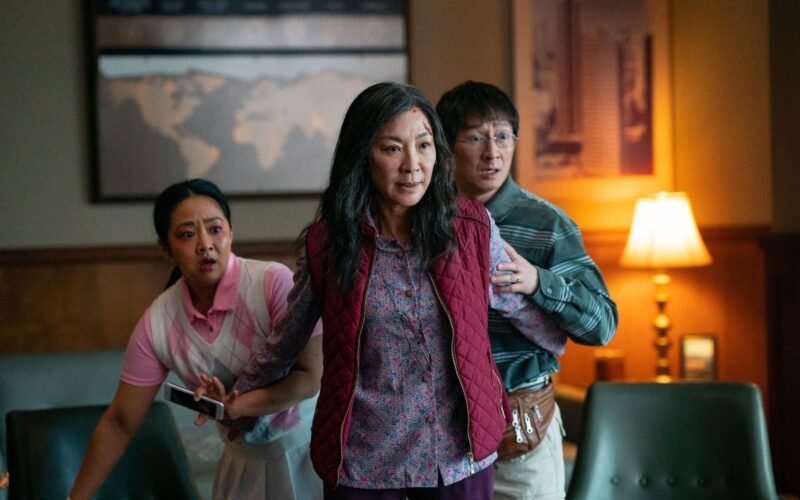Sign up here to receive The Yappie's weekly briefing on Asian American + Pacific Islander politics and support our work by making a donation.
“Everything Everywhere All at Once” made history Sunday at the 95th Oscars as the film swept the awards with seven wins—including Best Picture.
Directed by Chinese American filmmaker Daniel Kwan and his longtime collaborator Daniel Scheinert, the movie centers on a Chinese American immigrant who, while facing a tax audit for her struggling laundromat business, discovers that she must save the world by jumping between parallel universes and connecting with the lives she could have led.
Marketed as a martial arts fantasy film that explored themes of immigration, family, and intergenerational trauma, the film received near universal acclaim and grossed over $107 million worldwide.
The wins are notable given Hollywood’s long history of shutting out Asian talent and stereotyping Asians on screen. They also come amid heightened anti-Asian sentiment due to the COVID-19 pandemic and diplomatic tensions exacerbated by the recent discovery of a Chinese spy balloon over South Carolina.
“Everything Everywhere” earned a leading 11 nominations this year. Kwan and Scheinert, collectively known as the Daniels, took home trophies for Best Director and Best Original Screenplay in addition to Best Picture. Notably, Kwan is the third Asian American nominated for Best Director following Lee Isaac Chung in 2021. Their film also won an Oscar for editing.
Malaysian actress Michelle Yeoh, who played the protagonist in “Everything Everywhere,” made history as the first person of Asian descent and the second woman of color to win Best Actress. She was also the first actress nominated to self-identify as Asian—Merle Oberon was nominated in 1936 but hid her South Asian heritage throughout her career.
Vietnamese American actor Ke Huy Quan, who portrayed the husband of Yeoh's Evelyn, took home Best Supporting Actor while their costar Jamie Lee Curtis won Best Supporting Actress—a category that included Stephanie Hsu, who played Evelyn's daughter in the film. Quan and Yeon's awards make them the first two Asian actors to win in the same year.
Though they were a mixed bag in terms of diversity—no Black talent was nominated in the lead acting categories and women were shut out of best director—this year’s Oscars were noteworthy for having the most Asian actors recognized with four nominations.
The film industry has a long history of shutting out and stereotyping Asian talent. Hollywood has frequently stereotyped Asian people as exotic kung fu masters, unsavory nerds, and submissive and meek, among other tropes—narratives that were then imposed on Asian Americans and wielded as weapons for discrimination. Films also frequently whitewashed Asian characters, a practice that still exists today.
Yeoh's Evelyn is not the first Asian character to be recognized in the lead actress category. That distinction goes to O-Lan of “The Good Earth,” the Chinese wife whose white portrayer won the Oscar in 1938.
Though two of the last three Best Picture winners were directed by Asian filmmakers, the Academy has typically fallen short when it comes to recognizing actors of Asian descent. Best Picture-winning films like “Parasite” and “Slumdog Millionaire” failed to earn even a single acting nomination for their Asian cast.
Quan himself has been vocal about the challenges he faced in Hollywood. He began his career as a beloved child actor in “Indiana Jones and the Temple of Doom” and “The Goonies” but stepped away for 20 years because there were so few opportunities available. (It’s worth noting, though, that the industry patting itself on the back for Quan’s comeback is an irony considering it was responsible for his exclusion in the first place.)
The cultural power of this moment in Hollywood history is significant, heightened by a parallel surge in representation in politics as people of Asian descent seek to tell their own stories and define themselves on their own terms in an anti-Asian climate.
In acceptance speeches and interviews throughout the awards season, the stars of “Everything Everywhere” have been outspoken about their experiences with racism and Asian representation in Hollywood, noting the significance of receiving recognition in an industry that has notoriously shut out and ridiculed people of color.
They’ve also shared how their lives as immigrants and children of immigrants shaped their work and discussed their desire to be seen and heard. On Sunday night, Kwan, Yeoh, and Quan all touched on their personal histories—with Quan describing his childhood experience as a refugee—and dedicated their awards to their mothers.
“The world is opening to the fact that genius does not stem from individuals like us on stage, but rather genius emerges from the collective,” Kwan said in his speech for Best Director. “We are all products of our context. We are all descendants of something and someone.”
Here are some other noteworthy wins and nominations from the 2023 Oscars:
- Japanese American stylist and costume designer Shirley Kurata was nominated for Best Costume Design for her work in “Everything Everywhere.” The group Son Lux, which composed the music for the film, received a nomination for Best Original Score—Japanese American singer-songwriter Mitski and Son Lux’s Ryan Lott and David Byrne were also nominated for Best Original Song for the soundtrack's “This is a Life.
- Vietnamese American actress Hong Chau was nominated for Best Supporting Actress for her role in “The Whale.” Makeup artist Judy Chin, who also worked on the film, won the award for Best Makeup and Hairstyling alongside Adrien Morot and Anne Marie Bradley.
- “The Elephant Whisperers,” an Indian American short film directed by Kartiki Gonsalves, won the Oscar for Best Documentary Short. Indian filmmaker Shaunak Sen also had his film “All That Breathes” up for Best Documentary Feature.
- The Indian songwriters behind “Naatu Naatu” for the film “RRR” snagged the trophy for Best Original Song.
- Domee Shi’s film “Turning Red” earned a nomination for the Best Animated Feature Oscar, marking the 10th consecutive year an Asian filmmaker was recognized in the category.
- Japanese British novelist and Nobel Prize winner Kazuo Ishiguro received a nomination for Best Adapted Screenplay for the film “Living.”
- Indian French cinematographer Darius Khondji was nominated for his work in the film “Bardo, False Chronicle of a Handful of Truths.”
The Yappie is your must-read briefing on AAPI power, politics, and influence, fiscally sponsored by the Asian American Journalists Association. Make a donation, subscribe, and follow us on Twitter (@theyappie). Send tips and feedback to [email protected].









